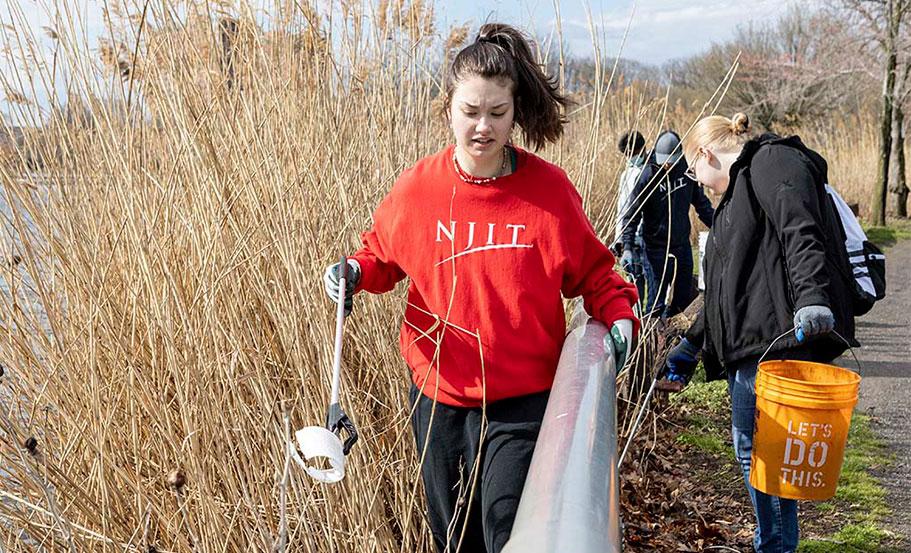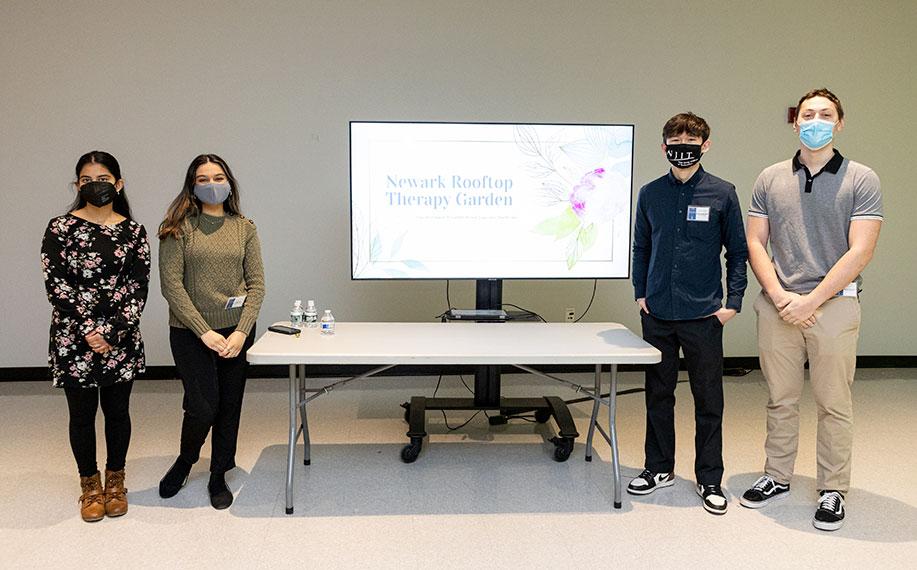Creating a More Sustainable NJIT: Biodiversity + Alternative Energy + Carbon Neutrality

In class, on campus grounds and in Newark, students at NJIT’s Albert Dorman Honors College are working toward creating a greener, more sustainable urban environment in keeping with the university’s broader push toward sustainability.
The students are acting locally even while they think globally about benefits of biodiversity and hazards of climate change. Their efforts include everything from planting trees and shrubs on campus and clearing debris from nearby Branch Brook Park to reimagining the garden atop the Campus Center.
For the latter project — part of the Honors First-Year Seminar — all first-year honors scholars researched the types of plants on the roof and proposed new plantings to heighten biodiversity and make the garden more appealing to birds, bees and the campus community. Four teams were selected as semifinalists by NJIT’s Urban Ecology Lab.
Each team pitched its ideas to a Shark Tank-like panel of NJIT administrators and the winner was Newark Rooftop Therapy Garden, which called for adding more than a dozen flowers, fruit and herbs, including black-eyed Susan, lowbush blueberries, lavender, wild bergamot, basil and mint.
The proposal, which was guided by Honors Academic Advisor Caitlin Kain and feedback from the Urban Ecology Lab, noted multiple benefits: aromatherapy to ease student stress, plant diversity to attract more and varied wildlife and insects, even ingredients for cooking and making tea. What’s more, the low-growing plants are native, perennial and low-maintenance and won’t overshadow solar panels already installed on the roof. Pretty thorough and strategic for four students still in their first year of college.
“Their plan distinguished itself with its balance between wildlife and herbs that can be used as well as the selection of plants that will grow throughout the year,” said Burçak Özlüdil, associate dean at Albert Dorman Honors College, who noted that the next class of first-year honors students will carry out the planting in the fall. “The selection committee also commended their overt emphasis on the therapeutic effects of the garden on the campus community.”

Beyond its curriculum, NJIT is investing in administrative, operational and R&D efforts that address global concerns around carbon emissions, climate change and sustainability, including:
- Hiring an assistant director of sustainability to develop and execute a climate action plan
- Sourcing electricity from a hydroelectric plant to prevent the creation of more than 31,000 metric tons of CO2 emissions — the equivalent carbon capture of 38,000 acres of forest
- Partnering with a wind farm developer to create related scholarship and career opportunities for Highlanders and expand STEM outreach to underrepresented minorities in Newark
- Pledging to become carbon-neutral campus and curb greenhouse gas emissions as part of a higher education coalition
- Ensuring that new construction, like the soon-to-be completed residence hall, Maple Hall, incorporates organic materials and maximizes energy efficiency
- Adding solar-powered charging stations to outdoor campus tables
Indeed, sustainability is a core value in the university’s strategic plan, “Building on a Strong Foundation — NJIT 2025,” and has shaped operations for years. In sum, university leaders are striving to do the right thing for the planet and at the same reflect the values of their students.
One of the scholars on the Rooftop Therapy proposal, Disha Patil, is majoring in biomedical engineering, with a minor in applied mathematics, as she pursues a career in medicine. And while that path doesn’t scream sustainability, she nonetheless sees a connection.
“From a medical perspective, taking care of the environment is how we ensure the health of future generations as well as reduce the negative impacts of pollution and climate change on the current population,” Patil explained. “There is an increasing emphasis on reducing hospital waste, disposing of chemicals in a way that doesn’t harm the environment, using less plastic in the production of medical devices, et cetera, in the medical field — all things that I hope to focus on in the future as a physician with an engineering background.”
